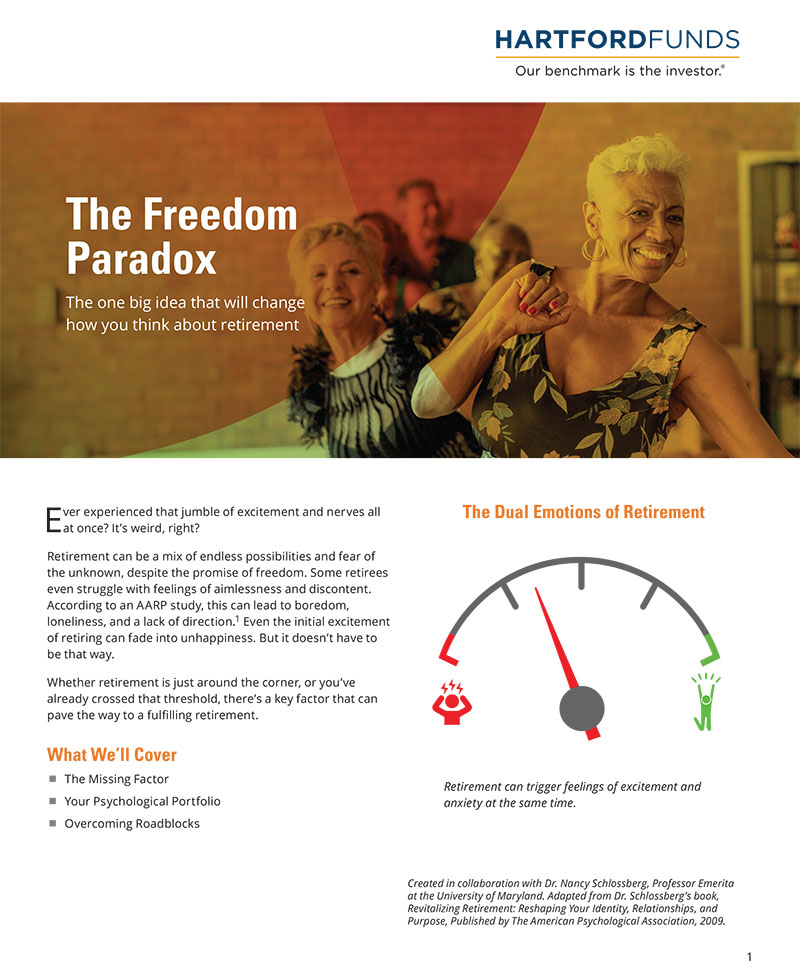Age Bias–It’s Everywhere
Nancy Perry Graham, an editor of AARP The Magazine wrote in the January 2010 issue: “Just listen to the late-night comics. Scarcely an evening goes by that David Letterman…doesn’t mock a certain 73-year-old politician with lines such as ‘During the presidential campaign, Sarah [Palin] had to cut up John McCain’s meat for him.’ Recently Jimmy Fallon (granted, a youngster, at 35) announced that the family of a 70-year-old man who had run his 163rd marathon would celebrate by ‘taking him out to a five-star emergency room.’” Similarly, many birthday cards for those over fifty have negative comments about aging like, “It’s all downhill after 40.”
These cards and comics are merely the tip of the iceberg. We are bombarded with messages that older people have less—less energy, less opportunities, less sex, less money. Except for wrinkles it is all about less. Nancy Signorielli, Professor in the Communication Department at the University of Delaware, studied the under-representation of elderly characters on prime-time network. She concluded that “Television celebrates youth while it neglects and negates the elderly…and [while] television’s messages about young adulthood are particularly vibrant and interesting, messages about middle and old age present a very different scenario because there are so few vibrant and interesting role models.”
These negative messages about aging have reached all of us – that is part of the reason we are frantically pursuing the fountain of youth. Even though there has been a decrease in the number of people having plastic surgery, there are still millions of women and men who go in for tucks and hair dying in an attempt to look younger.
When will we honor the person who says, “You look great–your hair is white, and your wrinkles sparkle?” When will we exchange wrinkles for wisdom, when will the messages from the media start honoring age? Changing attitudes means we must confront our own biases and celebrate rather than negate our age and wrinkles.
Fans of Dr. Schlossberg
Dr. Schlossberg,
I had had the opportunity to refer your book to many, most recently a librarian in Oklahoma who just retired last year. By the way, I am going to be able to put your observations into immediate use as I am retiring in one month. I have used what I consider to be your keyword, transitions, many, many times in conversations with others about this topic.
I came across a citation to your book one day while I was working at the Reference Desk. Not sure exactly what I was doing but when I saw it I knew I wanted to read it.
Joe Edelen
Associate Professor
Reference Services
University of South Dakota
www.usd.edu/library
Beware of your age bias or what’s in a name!
I have been part of a group that is trying to establish a national Institute in Sarasota county. We have been calling it the Institute of the Ages. Some have commented that people don’t want to be part of something that suggests aging. That led me to conclude that age bias is alive and well.
I want to explore two aspects of age bias. The first is our own bias about aging—the messages we give ourselves, the assumptions we have about aging. The second (to be explored in a later blog) are the messages we receive from society at large.
I will start with my own age bias. At a party, a convertible with the top down arrived. My first thought was how nice to be going to a party with younger people. I soon realized that the driver was a man who lives at the retirement community, Plymouth Harbor, with others in the car from the same place. I was startled. Is that the image I have of an 85-year-old man and if he is so “with it” why is he in Plymouth Harbor? My thought process reflected my bias about aging–that if you are in a retirement community you would not be in a convertible—especially in the back seat. I was doing is what we do all the time—we categorize people by age. We categorize teen-agers, middle agers, baby boomers and older people. But you and I know the reality—that there is more heterogeneity as people age, not less.
What do you think of the name, the Institute for the Ages? What assumptions do you have about aging? Let us know.
Nancy K. Schlossberg, www.transitionsthroughlife.com
Surviving in Troubled Times
Two stories about surviving in troubled times. With car dealerships closing at breakneck speed, Sue, a top salesperson making over six figures, realized that her financial survival depended on facing reality and making plans. She wrote: “I am going to work for Publix Super Market. I have many years of management experience and plan on working to get back up to management level—even though I will start at the checkout counter.”
Larry, a roofer who owned his own company, also saw the handwriting on the wall. His clients were not paying their bills and he recognized that his work was drying up. He therefore searched and located a larger company that would survive in these economically troubled times—a company that repaired roofs at places like the Smithsonian and the White House.
These optimistic stories do not make up for the millions of unemployed who are on the brink of financial disaster. I continue to hear, “We cannot pay our mortgage and it looks like foreclosure is ahead of us;” “It’s like an out of body experience. I cannot believe it is happening to me;” “I just cancelled my surgery, since it was elective.”
Whether you are a millionaire (probably losing at least 30 to 40 percent of your assets), or a construction worker unable to find work, you are facing the same common enemy. You cannot fix the economic crisis but you can survive. The following tips for those at both ends of the financial spectrum can help your psychological survival.
Tip 1: Take “For Now Jobs” Today; Dream About Tomorrow’s Career. This is the time to think about short-term goals like eating and survival and long-term goals like positioning yourself for a productive future. Jan Alston, Career Advisor at the Women’s Resource Center of Sarasota County, advises clients to take “For Now Jobs” in order to survive these bad times at the same time planning for a future dream job. This might be the time to return to school and get training for the future. Tanya does temp work when she can get it, and is taking courses at the community college to prepare her to become a medical technician. She is using this time to scrape together whatever funds she can AND using this time to prepare for a secure job in the future.
Tip 2. Reframe, Reframe, Reframe
There have been a number of studies of heart patients. Some recover physically from by-pass surgery with an optimistic attitude—I can now do whatever I want. Others are afraid to run, to have sex, to engage in life. Your style—optimism versus pessimism—will determine your recovery. And that applies to your troubled times. If you think you will never have another relationship when your current one ends, that you will never get another satisfying job, that you will never see your financial portfolio go up again, then you will be part of your own self-fulfilling prophecy. However, if you realize that there are always possibilities around the corner, that the door is never closed your chances of finding new happiness will increase. And remember, today is not forever!
Your Comments Please share the ways you are surviving these troubled times. Your story might help someone else.
My Take on Happiness—You need to “Matter”
The whole world is looking for happiness. A recent book giving specific instructions on how to obtain happiness is number 1 on the best seller list, a major PBS show “The Emotional Life” highlights the different definitions of happiness that ordinary people hold, and the ways scholars are studying the topic. Is it money, fame, power? Is it surviving an overwhelming crisis, experiencing a beautiful sunset, a observing a butterfly emerging? It is all of these things yet, happiness is still elusive, slippery, ever-changing. And when you feel it, will it last?
Well, I too have a take on what makes for happiness. My research for my book, Revitalizing Retirement concluded that you will have lasting happiness if you feel you “matter.” Let me explain. Morris Rosenberg, the late distinguished Sociologist from the University of Maryland, coined the phrase “mattering”—the need to feel noticed, appreciated, and depended upon—as one that describes a universal, and often overlooked, motive that influences our thinking and behavior. It is critical to believe that we count in other’s lives and feel we make a difference to them. Rosenberg found that teenagers who felt they mattered to teachers, peers, parents were less likely to engage in delinquent behavior than those who did not feel they mattered to others. He suggested, and I found, that retirees who no longer feel appreciated do not do as well as those who feel connected. With students at the University of Maryland, we studied mattering and retention of adult learners. And, not surprisingly, we found that those institutions with practices, programs, and policies that were responsive to the needs of adults, had a higher percentage of adults who completed their programs.
The universal need for happiness and the universal need to feel noticed and appreciated go hand in hand. You can have money and jewels, but if you feel sidelined, out of the loop you will be unhappy. So here are some happiness tips:
A Mattering Recipe—A Way for You to Feel Appreciated
1. Get Involved, Stay Involved—Volunteer, work part-time, “get out there” and become essential to a group or organization;
2. Harness the Power of Invitation—Take advantage of invitations. You never know where they will lead;
3. 3. Take Initiative—Want to be part of an organization, volunteer as an intern;
4. 4. Make Others Feel They Matter—Show your appreciation for what others have done, and even make that appreciation public.
Does this guarantee total bliss? No, but it is a start.
I would love to hear from you about ways you feel you matter and ways you have helped others feel they matter.


